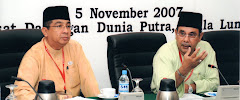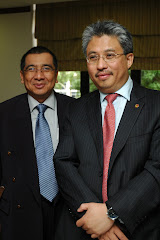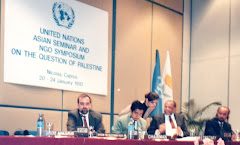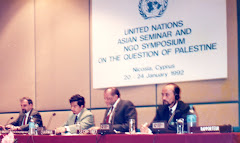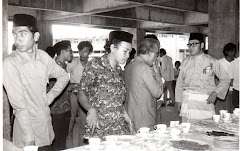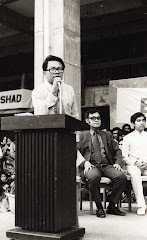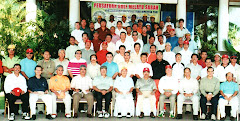Naim speaking at the General Assembly (archive photo)
REASON TO FIGHT: The party has to find its commonality
AN easy way for anti-Malay and Bumiputera elements to couch their racist intent is by directing their vitriol at Umno.
In doing so, they insist that their hatred and anger are not against Malays or Bumiputeras but the supporters, members and leaders of the political party.
Never mind the fact that Umno's raison d'etre is based on a Malay and Bumiputera agenda and that its struggle is defined as such.
This is something that cannot be said of its rival Pas, which insists that a struggle based on race is un-Islamic.
And that Umno -- based on the general election results, dominated more than half of the Malay seats contested and votes cast -- reaffirmed the fact that it represented the Malay and Bumiputera majority.
This fact is affirmed when it is widely accepted that the majority of Chinese voted for the opposition, meaning whatever Umno and its coalition partners secured in the polls were courtesy of Malay and Bumiputera support.
Umno's predicament is compounded when its partners, such as MCA and Gerakan, instead of being grateful that it was the Umno grassroots that had carried their candidates through, had chosen to blame Umno for their existence.
Then there are Malays and Bumiputeras who are opposed to anything associated with Umno and they became the poster boys of the racist elements.
These elements are, however, not new. These elements have been there since Umno's existence, and their presence moves with the ebb and flow of Umno's political fortunes.
What is more pressing for Umno is the elements within the party. The elements that want Umno to be redefined believe it is the only way for the party to remain relevant and to move forward.
Terms such as new politics, liberal and progressive agenda, bandied alongside the "sanctioned" transformation intent, have added new dimensions to the debate on where Umno is headed.
The advocate of this new politics, Datuk Saifuddin Abdullah, was doubly vanquished, first in the general election when he failed to defend his Temerloh seat and then losing in the contest for an Umno supreme council seat.
Umno Youth chief Khairy Jamaluddin associated his victory in defending his post as an endorsement of the liberal and progressive movement.
Khairy's pronouncement received a rebuke from a commentator of a blog, who goes by the pseudonym Ramayana, who questioned what the Youth chief meant by "liberal and progressive".
To the commentator, going by the popular notion of the term, a "liberal and progressive" agenda was something associated with PKR, and if that was what voters wanted, they would have voted for PKR and not Umno.
Another issue he raised was the fact that Umno was a centrist party. Extremism and hardliners have always been the realm of Pas and DAP.
The points shared by the commentator are interesting, regardless of whether they were used to debunk Khairy's contentions or otherwise, as they brought up the issue of Umno's current identity, or the lack of one.
While it is not an exercise to pigeonhole any of the Malay or Bumiputera political parties, the general perception is that Pas, despite its attempt to redefine itself, is viewed as a conservative religious-centric party with a tendency towards extremist outbursts.
PKR, though styling itself as a multiracial entity, is still viewed by Malay or Bumiputeras as too liberal for their taste.
Hence, Umno's centrist and pragmatic agenda continued to appeal to the community, as shown during the recent election.
This affirms another popular notion, that the reason many Malays and Bumiputeras voted for Umno was not because of the love for the party, but for their fear of DAP and PKR taking Umno's place as the nation's government.
The fear they felt towards these two parties stemmed from the perception that the former was opposed to the Malay or Bumiputera agenda while the latter's liberal ways would diminish the Malay or Bumiputera value system.
This notion is not complimentary to Umno, as its victory becomes one by default.
However, if given a different take on the matter, no matter how useless Umno has become, it is, to the majority of Bumiputeras, still better than the alternatives.
But surely winning by default is living dangerously, hence, the need to define itself becomes more pressing for Umno.
It has to ask itself whether it truly wants to struggle for the Malay or Bumiputera agenda, as it is currently understood by a specific cross-section of the populace.
It is not an uncompromising stance, but an affirmation of its struggles, and its pragmatism balances with this pursuit.
Or it can take the populist route, regurgitating oft-repeated political phrases that sound progressive, and be hip and turn into a Malay or Bumiputera apologist when unable to articulate what its agenda is because its heart is not in it.
The bottom line is, would the recently elected or re-elected Umno leadership believe in the Malay or Bumiputera agenda, and that they are in it to fight for their agama, bangsa dan tanahair (religion, race and nation), apart from whatever else that may have distracted them?
It has been Umno's raison d'etre, and its electorate expects it to continue living it. It may not sound too hip, but it does make Umno the real McCoy
Read more: Centrist Umno central to party strength - Columnist - New Straits Times http://www.nst.com.my/opinion/columnist/centrist-umno-central-to-party-strength-1.390522?localLinksEnabled=false#ixzz2jXvO9d10

































